营销管理:当代市场调研02英文版共23页
- 格式:ppt
- 大小:1.20 MB
- 文档页数:23
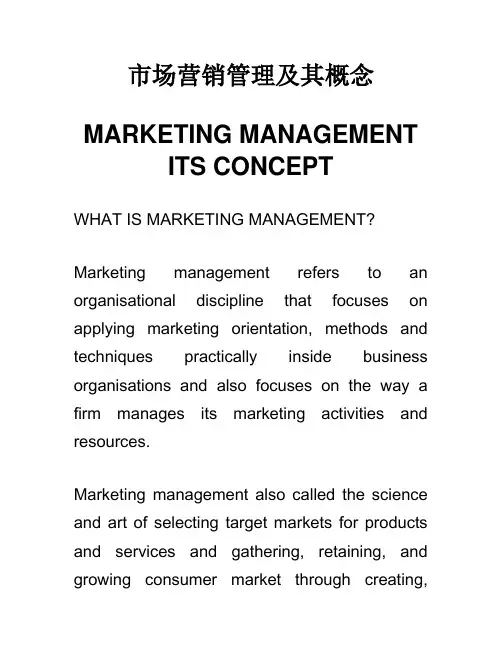
市场营销管理及其概念MARKETING MANAGEMENTITS CONCEPTWHAT IS MARKETING MANAGEMENT?Marketing management refers to an organisational discipline that focuses on applying marketing orientation, methods and techniques practically inside business organisations and also focuses on the way a firm manages its marketing activities and resources.Marketing management also called the science and art of selecting target markets for products and services and gathering, retaining, and growing consumer market through creating,communicating and delivering superior customer value.Marketing is known as a process used for determining what kinds of products and services might become able to grab customers’ attention and to gain their interests. Furthermore, it is the strategies a business organisation needs to follow in practising sales, business development, and communication-related activities to run its regular operations.According to the definition provided by the American Association of Marketing, marketing management is a process of planning and execution of the conception, distribution, and promotion of thoughts, ideas related to goods and services for creating, exchanging andsatisfying individual as well as organisational objectives.The concept of marketing management involves marketing and management. Management is a set of processes related to planning, organizing, directing, motivating, coordinating, and controlling a business organisation’s various activities. On the other side, marketing stands as the procedure of sa tisfying customers’ wants and needs.Management of different types of marketing activities of an organisation called Marketing Management. In support of the statement made by Philip Kotler, marketing management includes planning, analysing, implementing and controlling programs that are designed for bringing the desired exchanges with the targetaudiences to gain personal as well as mutual gain.Marketing management heavily relies on the adoption and coordination of product, price, place, and promotion for achieving the required response from the target audience. It focuses on the physical and psychological factors of Marketing. The physical marketing factors focus upon fulfilment of the demand and needs to buy better products by accessing better distribution channel and other functions.On the other side, psychological factors use to focus on discovering consumers’ wants and needs along with the changing patterns of their buying behaviour, preferences, habits and more.Elements of Marketing ManagementMarketing management practices are very important for every business as it helps businesses to understand and gauge the exact need and want of their target customers. It helps companies to improve products and services for satisfying customers’ needs optimally.Expand the technique to reach potential customers.While practising marketing management activities, a company needs to focus on five different concepts such as production concept, product concept selling the concept, the marketing concept, and societal marketing concept. The production concept is oriented with the market domination of a business. This concept has emerged with the concept of capitalism during the mid-1950s.During the 1950s as per production concept, companies were primarily concerned with manufacturing, production, and issues related to production and manufacturing efficiency. Companies that follow this concept believe that primarily customers want products which are accessible and affordable.Product concept works on the basis of an assumption made that customers use to prefer products with greater price and quality and the availability of such products does not influence their buying decision.Selling concept uses to focus on making actual sales of products and services. It focuses on every possible way of selling a product, without considering the product quality or customers’ need for the product.The marketing concept is the concept of promoting a product into a market and towards its prospective customers. A company which focuses on this concept uses to place its consumers at its centre and gears its all activities towards those consumers.A company always aims to measure and understand its target customers’ wants and needs and in order to understand it the company sets and executes marketing strategies according to the market research starting from the product conception to sales.Relative to the other marketing concept, the concept of societal marketing is new. It highlights the wants and needs of a company’s target market along with the act of delivering better customer value compared to thecompetitors. Moreover, it emphasizes the significance of customer and social well-being by consumer welfare and societal welfare.Concepts of Marketing ManagementIn today’s rapidly growing and changing market competition, customers’ choice, companies use to consider all these concepts to set effective marketing strategies. The more the marketing strategies are effective the great a company becomes able to achieve its marketing objectives within less time and cost. All the five above mentioned market concepts are required to be followed properly by every business organisation in order to perform its marketing management practices in the most effective way.Besides these marketing management concepts, there are seven basic principles that arerequired to be followed by every business organisation while conducting marketing management practices. These seven marketing principles are a product (or service), price, place, promotion, people, process, and physical evidence. All these elements of marketing are tremendously significant for a company to plan, develop and market a product successfully. Now we will tell you about the Functions and Importance of Marketing Management.Functions and ImportanceMarketing management process is solely concerned with chalking out a definite program, after analysing and forecasting the prevailing market carefully. It helps an organisation to execute its plans in order to achieve its objectives. The concept of marketingmanagement becomes very important for business organisation intended to meet rapidly increasing market competition as well as the requirement for more improved distribution methods for reducing cost and increasing profits.In today’s highly competitive busi ness environment, marketing management becomes one of the most vital functions in a business enterprise. It assists a business organisation to apply marketing techniques inside and outside of the organisation and to manage resources of the organisation that are held for conducting marketing activities.The reasons for which marketing management become very important to include its ability to satisfy customers’ needs, increase a company’s market share, production of new and existingproducts, launch new and improved products, and reduce the cost of distribution and sales.It also important because it provides employment opportunities and hence fulfils social obligations, and raises a country’s per capita income. By creating and increasing demand for products and services it accelerates market growth, competition, and new product development.In terms of creating a highly effective strategy of marketing management, every business organisation is required to have a clear and strong understanding of its own business operations, market from where it operates, and the customers for whom it operates.In order to assist a company to understand the market and the behaviour of customers located in the market, marketing management takes a vital role by performing different types of functions. The key functions of marketing management are discussed below:Setting marketing objectives: Every business organisation has its own objectives and goals. Marketing objectives of an organisation include the targets it wishes to reach or achieve through marketing. These marketing objectives need to be in coherence with the organisation’s overall objectives which can be short-term or long-term depending upon the marketing type. By managing marketing related activities, a company becomes able to achieve its marketing objectives easily.Planning: The root of every business is planning. It requires that a company’s marketing managers need to aware of every factor influences the external and internal business environment that might impact the company and its business operations. The managers must be able to forecast their company’s future condition by considering the environmental conditions. Once a company sets its marketing objectives, it starts to formulate a roadmap to follow for achieving these objectives. The company plans the way and formulates strategies, devices procedures and policies to achieve the goals it has set previously.Organising: Organising is a process of implementing the plan. Organising includes identification and grouping those activities which could contribute to achieving the marketinggoals of an organisation. In the field of marketing management, organising is a way by following which a company’s management functions are organised to make each function contributes its best in the achievement of the marketing objectives. Organising includes every obligations, responsibilities, and supremacy of the people working as a member of a company’s marketing team.Directing: For the managers of a company, it is their obligation to supervise whether the employees are working effectively and efficiently in order to support the organisation to meet its goals. The managers of a company provide directions to the employees on how to work and what to achieve. Hence, the direction of a company’s management personnel motivates employees to give their best for the organisationthey work in. Proper direction of managers or management personnel not only motivates employees but also inspires them, guides them and build a good relationship with them by exercising effective leadership practices within an organisation. It ensures smooth and conflicts free working environment that ultimately assists a company to meet its marketing objectives and goals.Coordinating: It refers to the harmonious adjustments of marketing activities by an organisation. It involves the task of creating coordination among different activities of a business organisation such as product planning, development of a product, forecasting of sales, transportation, warehousing and more.Staffing: It is the procedure of hiring a required number of skilled personnel and employees for several positions in an organisation. In order to manage the existing market, skilled employees are selected through an interview and after then they placed in different positions that suit them the best. The human resource manager along with the marketing manager selects personnel and employees and then trained them to make them fully capable of providing their best for the organisation. By appropriate staffing, managers ensure the organisation about gaining the maximum benefit from the employees recruited by them. Employment of the right and highly efficient employees is a crucial task in ensuring the success of the market plan.Controlling: The procedure of comparing the planned marketing activities with results andafter that, rectifying errors, if any, is called controlling. Hence, in order to practice controlling activities, an organisation must set some standards and its actual marketing performance needs to be compared with those standards for finding out flaws or defects. Then, corrective actions need to be taken for enhancing marketing activities. Controlling ensures a company that its performance does not deviate from its standards. While performing controlling activities, the performance standards established by the marketing managers of a company are often represented in terms of products (in units) produced, number of damaged or defective products, customer service level, costs, revenue, profits and more.Evaluation: The functions of marketing management also involve analysis andevaluation of the productivity of a company’s marketing campaigns, programs as well as evaluation of its employees’ performance. This particular function of marketing management helps an organisation to detect the loopholes of its marketing activities and to reset or reshape its marketing activities to achieve its marketing objectives successfully.Functions of Marketing ManagementImpact of Marketing Management on an Organisation’s SuccessIn today’s highly competitive business world, marketing acts as the interface between an organisation and its external environment i.e. its surroundings, more specifically with customers. It becomes one of the most crucial andsignificant activities of modern corporate companies and their management.The rapidly increasing competitive pressure, ever-changing markets, shorter product life-cycles in the globalised world becoming increasingly important to consider because these allow a company to create real-time corporate value. In accordance with the growing demand for conducting marketing practices, the management of marketing activities also increased.Marketing management practices of a company help it to focus on its customers’ d emands in a consistent manner and make it more capable of capitalising its potential customers. It assists a company to make need-oriented focus to transform potential customers into actualcustomers, to create brand image and value and to build a profound insight into the customers and the industry from where it operates.Marketing management practices helps a company to reduce barriers to its growth. In terms of promoting and making a company and its products familiar to the target audience, marketing plays the most important role. The process of managing the here major marketing activities like segmenting, targeting and positioning ensures a product’s success and failure Appropriate strategies of marketing management practices helps a company to identify the most profitable customer segment i.e. the target market, and to develop marketing events and campaigns for optimising the consumers belongs to the target market.。
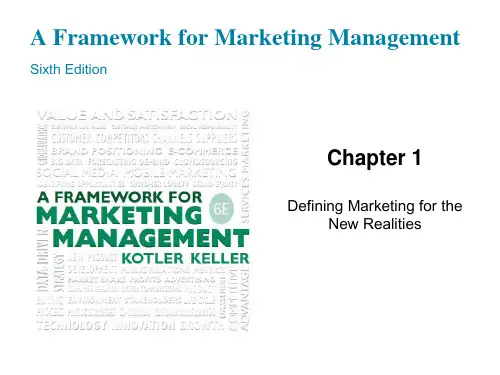
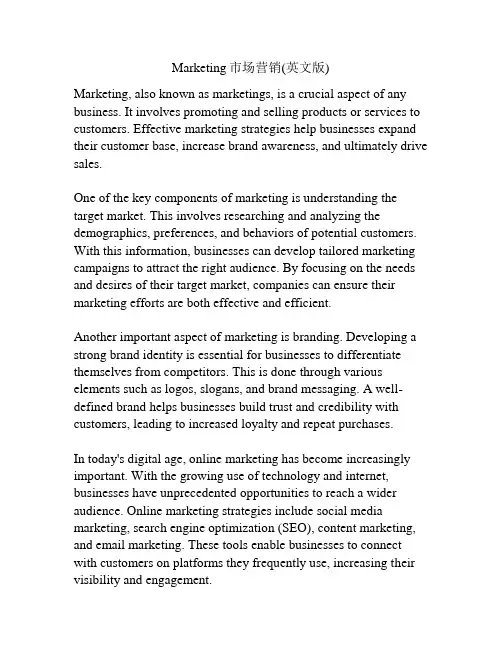
Marketing市场营销(英文版)Marketing, also known as marketings, is a crucial aspect of any business. It involves promoting and selling products or services to customers. Effective marketing strategies help businesses expand their customer base, increase brand awareness, and ultimately drive sales.One of the key components of marketing is understanding the target market. This involves researching and analyzing the demographics, preferences, and behaviors of potential customers. With this information, businesses can develop tailored marketing campaigns to attract the right audience. By focusing on the needs and desires of their target market, companies can ensure their marketing efforts are both effective and efficient.Another important aspect of marketing is branding. Developing a strong brand identity is essential for businesses to differentiate themselves from competitors. This is done through various elements such as logos, slogans, and brand messaging. A well-defined brand helps businesses build trust and credibility with customers, leading to increased loyalty and repeat purchases.In today's digital age, online marketing has become increasingly important. With the growing use of technology and internet, businesses have unprecedented opportunities to reach a wider audience. Online marketing strategies include social media marketing, search engine optimization (SEO), content marketing, and email marketing. These tools enable businesses to connect with customers on platforms they frequently use, increasing their visibility and engagement.Another effective marketing technique is influencer marketing.This involves collaborating with influential individuals, such as celebrities or social media personalities, to promote products or services. By leveraging the popularity and credibility of these influencers, businesses can reach a larger audience and gain credibility and trust from their followers.Marketing also involves analyzing and measuring the effectiveness of marketing campaigns. This is done through metrics such as return on investment (ROI), customer acquisition cost (CAC), and customer lifetime value (CLTV). By tracking these metrics, businesses can evaluate the success of their marketing efforts and make any necessary adjustments to optimize their strategies.In conclusion, marketing plays a vital role in business success. It helps businesses understand their target market, build strong brands, and reach a wider audience through various channels. By implementing effective marketing strategies, businesses can increase their customer base, boost brand awareness, and ultimately drive sales.在一个竞争激烈的商业环境中,有效的营销策略是企业取得成功的关键。



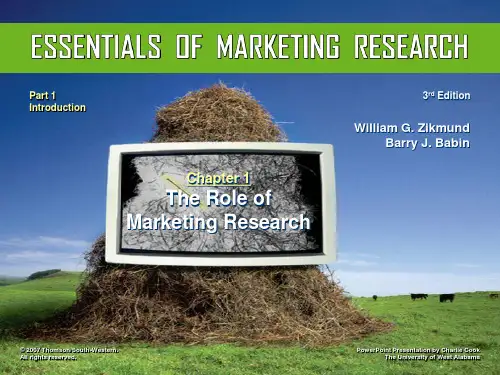

(市场调查)服装市场营销调研中英文Fashion sportswear s investigation report1.Table of Contents2.abstract3.general introduction1.1 background1.2 aim and objectives4.scope of study and methodology5.The body of research6. main statistical result7.analysis by synthesis8.conclusion and proposalAppendix one:questionnaire Appendix two: questionnaire pictureAbstract:Along with the socio-economic development, the apparel industry has been booming, while younger fashion consumer groups attracted more and more attention. (Young, hip consumers refers to between the ages of 15 to 35 years old Demand for garments with a strong conditions but the economic are not very enough groups, generally are college students or just into the society's inauguration) As the younger fashion consumer groups, making it different from other societies the consumption psychology and behavior of consumers. They have advanced consumer attitudes, but restricted by its economic strength. Strong consumer demand, it will make them appear irrational consumption or some other consumer issues. Thus, through clothing to young, hip consumers consumer survey and research, we can grasp the new trend in consumption.general introduction :1.background,aim and objectivesIn order to understand the young, hip consumers demand for clothing, as well as young, hip consumers perception of clothing, what needs to be improved, through clothing to young, hip consumers consumer survey and research, we can grasp the new trend in consumption.2, research topic----young fashion consumers for investigation of smart casual clothing.I hope that through this study to know the younger fashion consumer demand for stylish casual wear. Such as the product, series, pricing, channel marketing needs. Consumers like what kind of products, such as color, fabric, pricing and promotions and other preferences.scope of study and methodology:(A) the scope of sampling this survey targeted at school students and the school-age population (b) sampling survey taken a hierarchical scale of non-probability sampling methods (c) the survey methodology consumer survey questionnaire and interview survey (d) investigations number: 50.The body of research:Of which I am the younger fashion consumer groups (15-35) clothing market research, survey number 50. Waste volume 1 (2%). This report will be investigated in accordance with the questionnaire analysis of the classification of occupations. Type: class a student 36% a total of 18 people. White-collar class b 20% a total of 10 people. Class c service 28% a total of 14 people. Class d 14% a total of 7 people. This youthful group, our investigation will have no small gains.Now, below to see our survey results:1.Proportion of men and women2.Monthly basic living expenses3.Average monthly on clothing consumption.On clothes each semester spent most of the girls and boys from 301 to 500 Yuan, but within each price range there is still a difference: When you spend less than 300 yuan, the proportion of boys than girls; spent 300 yuan and above, the proportion of boys than girls. Visible in the overall consumption level in much the same circumstances, girls in spending on clothing has been lower than for boys.4.Preference type brand clothingData can be seen, this type of consumer preference sports apparel and leisure class dress.And after my investigations, in addition to work, the consumer groups very little clothing to choose a career.5.Favorite fashion styleCan be seen through the data, consumer groups like the European and American avant-garde style with more people, they like the atmosphere, highlighting the personalities and fashion clothing.Favorite clothing brand6.Below, I will do it through different occupational classification analysis.First of all we will be occupations to students involved in a specific analysis of the questionnaire. Specific analysis are as follows:Occupation: student (a total of 18 people age range 18-24 years)Forms can be intuitively seen students shopping for 4-10 times per month.College life with relative ease, so more students ' time.More time is spent shopping is also relatively.At this point can be seen most students can accept clothing priced below 300 yuan, for students, garment prices should be set at around 300, priced relatively easy for students to take and bring about a deal, increasing the turnover rate.General student selection can be seen around the Foreign trade and leisure store, hypermarket or online store,fashion clothing store to purchase objects for students should not be the store décor look on luxuries.Not need priced very high place set up shop, founded his own clothing store also opened up online sales channel.Through forms and research indicate that most students lack of trust tothe net purchase, buy cheap online prices are very attractive of them to spend,and because of the postage would prompt them to buy more for postage purposes.It can be speculated that clothing styles for students is diverse. But lots of personality, atmosphere's clothing is more preferences.Students favorite brands are not thesame, the brand is the brand of choice for most students to take, however, questionnaire investigation they learned that most of the students liked the brand, but they will not buy, because there is no purchasing power. Better not to do something for the students ' clothing sales price is not easy to let students accept brand. Most of the students are still talking about, relatively easy to accept is modestly priced mass brands 。
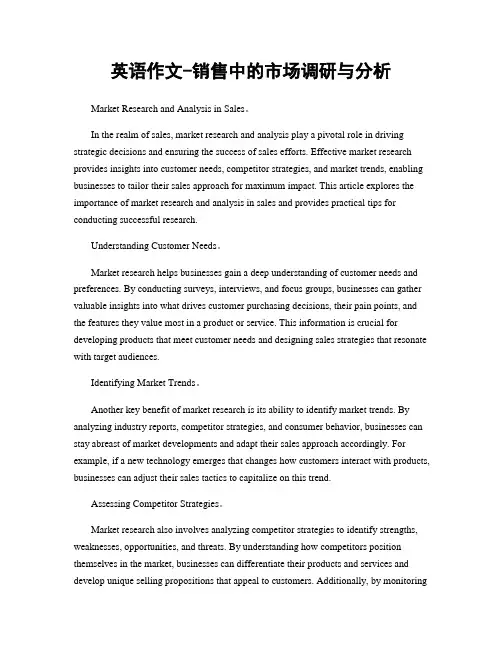
英语作文-销售中的市场调研与分析Market Research and Analysis in Sales。
In the realm of sales, market research and analysis play a pivotal role in driving strategic decisions and ensuring the success of sales efforts. Effective market research provides insights into customer needs, competitor strategies, and market trends, enabling businesses to tailor their sales approach for maximum impact. This article explores the importance of market research and analysis in sales and provides practical tips for conducting successful research.Understanding Customer Needs。
Market research helps businesses gain a deep understanding of customer needs and preferences. By conducting surveys, interviews, and focus groups, businesses can gather valuable insights into what drives customer purchasing decisions, their pain points, and the features they value most in a product or service. This information is crucial for developing products that meet customer needs and designing sales strategies that resonate with target audiences.Identifying Market Trends。
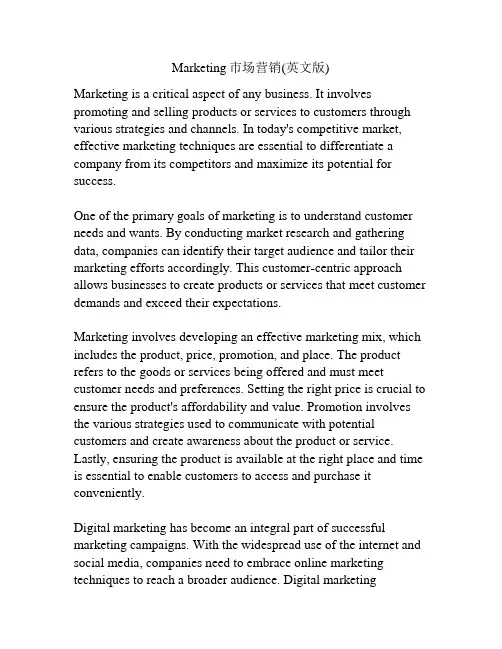
Marketing市场营销(英文版)Marketing is a critical aspect of any business. It involves promoting and selling products or services to customers through various strategies and channels. In today's competitive market, effective marketing techniques are essential to differentiate a company from its competitors and maximize its potential for success.One of the primary goals of marketing is to understand customer needs and wants. By conducting market research and gathering data, companies can identify their target audience and tailor their marketing efforts accordingly. This customer-centric approach allows businesses to create products or services that meet customer demands and exceed their expectations.Marketing involves developing an effective marketing mix, which includes the product, price, promotion, and place. The product refers to the goods or services being offered and must meet customer needs and preferences. Setting the right price is crucial to ensure the product's affordability and value. Promotion involves the various strategies used to communicate with potential customers and create awareness about the product or service. Lastly, ensuring the product is available at the right place and time is essential to enable customers to access and purchase it conveniently.Digital marketing has become an integral part of successful marketing campaigns. With the widespread use of the internet and social media, companies need to embrace online marketing techniques to reach a broader audience. Digital marketingstrategies include search engine optimization (SEO), content marketing, social media advertising, email marketing, and influencer marketing. These methods help businesses connect with potential customers, increase brand visibility, and generate leads.Another critical aspect of marketing is building and maintaining strong customer relationships. Customer relationship management (CRM) is a strategy that helps companies track and analyze customer interactions to improve their overall experience. By understanding customer preferences, addressing their concerns, and providing excellent customer service, companies can build loyalty and retain customers in the long run.In today's fast-paced and highly competitive market, companies need to stay ahead of their competitors by continuously enhancing their marketing strategies. This requires staying updated with the latest marketing trends and technologies, monitoring competitor activities, and adapting accordingly. Additionally, companies must be flexible and willing to adjust their marketing efforts as market conditions and customer preferences change.In conclusion, marketing plays a vital role in the success of any business. By understanding customer needs, developing an effective marketing mix, embracing digital marketing techniques, and building strong customer relationships, companies can maximize their potential and stay ahead of the competition. It is crucial for businesses to continuously improve their marketing strategies to remain relevant and meet the evolving demands of their target audience.继续发展相关主题-内容营销:内容营销是当下营销领域的一个重要策略。

市场调研报告英文(共15篇)市场调研报告英文(共15篇)第1篇英文调研报告Profeional research reportoriented, with clothing as the carrier, the social value, cultural connotation andaesthetic temperament and personalitytraits in original into the fabric and garment appearance modelling, colour, leading the fashion.With the development of society and progre, people will bee more and more high to the requirement of clothing.,Especially since the re and opening up, Chinas garment industry has obtained the development which progrees by leaps and bounds, change The old grey, blue, and black as the main tonal clothing patterns, people dre moreRich andcolorful.Clothing design is a prehensive very strong industry, it requires the designer with aesthetics, painting, playing version, tailoring the aspects of profeional knowledge, at the same time with strong artisticacplishment and aesthetic ability, and havestrong changes of clothing market ight into ability.二Career prospects and employment situationChina is the worlds largest clothing consumer, as Chinas rapideconomic development, improve the level of consumption, and promote the peoples life the pursuit of fashion and clothing industry in the development of the domestic market, busine petition, talent market petition to garment industry has brought the new change, the enterprise furtherdemand for talent in extent, also further expand on breadth, the face of the demand for garment industry being stretched wide.With the augmentation of the national strength, Chinas garment industry got great development, in the gro domestic product GDP and occupies a considerable proportion in the total export, China has bee the worlds largest apparel exporter.The economic development in Asia, eastern designer talent show, make dongfeng west gradually appeared on the international transfer of culture.With the development of global economic integration, the realization of Chinas acceion to the WTO, China bee a huge market, there are unlimited busine opportunities, Beijing, Shanghai, more and more get the attention of the world.Beijing the capital of culture has bee Chinas fashion centre.Will bee the French Paris, milan, Italy, the United States, New York, London, Tokyo, Japan, afteranother fashion.In such an environment Chinas garment industry is facing huge opportunities,will also encountered great challenge from foreign famous brand clothing, costume design talents is being a hot spot of petition.In many apparel jobs, clothing designers greatest demand, is also themarket most supply shortage of profeional talents.China is only good for version, no outstanding designer, foreign design expert reviews, shows that Chinas garment industry as a world factory.We can get the latestdesigner leather imitation as the original, but couldnt design the piration of the original works, rich in large extent, restrict the development of Chinas garment industry, a domestic fashion designers have some concerns with the status quo.三Profeional office1.Has a wealth of knowledge and the flexibility and ability to draw leons from.Design is not created on a whim, want to invent a overnightKind of unprecedented new clothing is not realistic.Because of the change of clothing proce is continuous, each kind of dre is in human clothing culture in the history of the development of the chain, so,Clothing design cant be out of thehistory and reality and exist in isolation, the designer must beStudy and research the design of the previous achievements and experience, have to face the reality of social life.Therefore, a qualified designer, first must be familiar with the development of national clothingHistory, understand the development of the clothing history, master the regular pattern of change.As countries and allNational culture includes costumeculture is continually municate with each other and influence, so, alsoTo understand the Chinese and foreign the dre culture of other ethnic groups.2.Has a profound artistic attainments and rich imaginationClothing design is not only a product design, and is also a kind of artistic creation.aA good clothing design work, can not only provide people with awell-dreed costume,At the same time also can give a person with beautifulenjoyment.3.Have the ability to independently design and productionDesign is an innovative proce, have made a very good idea, after the next workAs is how to plete and implement these ideas.四Job content, environment and salaryFashion designers work content1 is responsible for managing a brand productdesign direction;2to determine the preliminary design;3 with profeional requirements, functional and fashionable elements as the foundation of design implementation, to ensure that the design to meet the pany product market positioning;4 according to the stipulated time to plete the product series of draft plans;5follow up.Working environment petitive clothing pany.Salary depending on the different regions, the Yangtze river delta, the pearl river delta developed cities, such as salary will be higher, and just started when the costume designer salary is low, maybe you make a month with the cost of living is not enough you, but if you are succeful, then you can pay to let you not to worry about the rest.第2篇市场调研报告南京某高校大学生于年6月在华北地区和华南地区进行了一次手机市场调查。
Marketing(From: Sun Kun of Accounting English, 2008.)Marketing is a group of interrelated activities designed to identify consumer needs and to develop,distribute,promote,and price goods and services to satisfy these needs at a profit.Whether an organization is large or small,whether it produces a product or provides a service,its long-range future is linked to successful markting practices.The old saying "Build a better mousetrap and the world will beat a path to your door"is not true. "They" must need the product,know about it,be able to get it when and where they want it,and be able to afford it.Marketing provides the means to make the organization successful in the long run.1.The Marketing ConceptMarketing was unheard of in the early 1900s. This period can best be described as one where far more people needed consumer goods than companies were able to manufacture.This intense demand on manufacturing led to organizations dominated by production management. Companies had a production orientation: where the number one priority is to produce a good to keep up with demand. All energies and talents were laced in the production function. Selling a good was incidental; determining consumer needs was unheard of.As manufacturers increased their production capabilities,the supply of goods available increased and inventories of goods developed. An emphasis on selling occurred. This need to sell led to a sales-dominated company-a sales orientation,whereby the energy of the company is focused on selling the products produced. The salespersio's job:(1)to make the desires of the consumers "fit"the products the company manufactures and (2)to convince the consumer to buy. The company's goal:to"send the out full and bring it back empty."As more producers began competing for consumer dollars by making such high-demand products as automobiles,vacuum cleaners,and refrigerators,the supply of goods began to exceed the demand. Companies had to find a way to identify consumer demand.Company profits.Companies that are marketing oriented have adopted a philosophy for the firm known as the marketing concept.The marketing concept is a belief that the companyshould adopt a companywide consumer orientation directed at long-range profitability.It includes the belied that all efforts of the organization should be directed at identifying and satisfyingProduction OrientationCompanies were essentially production-oriented from the latter part of the nineteenth century to about 1920. Emphasis was placed on filling the demand for basic commodities. The typical family had little discretionary income and there was little demand for products not associated with filling those basic family requirements.Demand was usually supplied by the producer's perception of what consumers needed. Product design and product line decisions were heavily influenced by manufacturing considerations.Management attention was directed primarily toimproving production methods,increasing output,and lowering costs. Sales OrientationThe period of sales orientation covered roughly the years from 1920 to 1950.With the exception of the years of the Grat Depression ,this period was characterized by gradually rising discretionary income,emerging demand for products,increasing competition,and the expansion of distribution channels.Although product decisions continued to be dominated by what the manufacturing department wanted to make ,the role of sales became increasingly important. With the production department capable of tuning out increasing quantities of goods through mass production techniques,company success began to turn on the ability of the sales force to move inventories.Market OrientationCovering the years from about 1950 to 1970 ,this period was characterized by a continuing shift in business emphasis to understanding and reacting to changing markets.The dramatic rise in consumer discretionary income following World War II created demand for new products and services. The mobility provided by mass ownership of automobiles encouraged the development of suburbs, new shopping patterns, and changes in distribution methods. Markets became more segmented and more complex. Product life cycles shortened.With these conditions,production people no longer were in a position to determine accurately what would sell. Selling skills were no longer sufficient to overcome the problems created when products were not attuned to a more discriminant market demand. In order to provide a better fit between marketdemand and company offerings-and in order to provide for better coordination of marketing activities-companies reorganized and assigned increased responsibilities to the marketing department.Marketing took on the role of analyzing markets and interpreting the needs, and manufacturing departments. More sophisticated aproaches were developed to fulfill the traditional marketing roles of product promotion and the management of distribution channels. The role of marketing in pricing increased.And finally, the marketing department became the focal point for the development of corporate strategies needed to adjust to market change.Societal OrientationWhen managements adopted the marketing concept, they could not foresee the environmental problems or the changes in society's values that would raise questions about the market orientation philosophy. In terms of what we now know about pollution, the finiteness of raw materials, and the apparent inability of our economic system to eliminate poverty, some people question whether what is good for the individual consumer is always good for society.Increasingly, national policy-and, in turn, business policy-is tempering concern for the consumer with concern for society as a whole. Thomas A. Murphy, chairman of General Motors, addressed this dilemma when he said , "We may have let ourselves grow out of touch with the customer's need for continued satisfaction in a time of heightened expectations and the society's concern for environmental improve-ment and energy conservation."Marketing policies attuned to serving the market as the market wants to be served continue to represent modern company policy. But we are also seeing market-oriented decisions modified by societal concerns, as a result both of law and of responsible management policies.2.Channels of distributionEfficient production methods, coupled with skilful marketing ,may have ensured that we can produce goods or services cheaply and that there is a market for them. There remains the vitally important question of how we actually get our goods and services to the customer.Direct sales to CustomersThis ,of course, is the oldest form of distribution and in many trades it remains the most important. However, it can be a very awkward one in somebusinesses such as manufacturing. Customers especially private buyers, are unlikely to go to a factory to buy what they want, and manufacturing firms , at least one company seeking to sell its chains of petrol filling stations in the mid 1980s.There are other trades where producers sell directly to customers. In some cases this is because producers find it advantageous to control the final retail stage and be in a position to offer a complete service, including after-sales service,to the customer.In other industries producers may sell directly to consumers through factory shops, farm shops ,"pick-your-own" arrangements at farms,by mail order or any other scheme that business ingenuity may devise.Organized MarketsAfter direct selling ,markets represent the oldest form of trade from producer to consumer. Here we have in mind not the ratail mardets found in many towns on "market days" but the markets where producers and traders, especially the traders in commodities make their deals . These markets , located in many of the world's major trading centers , including London where most of the main British commodity exchanges are found ,bring together producers and traders who wish to buy in bulk for onward Distribution to the final customer.By commodities we mean goods such as tin, copper , zinc and other metals or bulk foodstuffs like tea, coffee, wheat and cocoa. What distinguishes commodities is that they tend to be sold on the basis of objective descriptions , such as " Brazilian coffee" or "Sri Lankan tea", rather than according to some brand name, though, of course, the experienced buyer will be able to distinguish high and low quality goods according to their source or to a wholesaler.WholesalingThe markets we have just outlined are wholesale markets . Wholesaling involves purchasing goods in large quantities from the producer or importer and selling in smaller quantities to the retailer, or sometimes, to another wholesaler or dealer. A service is provided as the producer prefers to deal with large orders and the retailer in smaller purchases. There are ,however, other services provided by wholesaling besides this 'breaking bulk.Conventional wholesaling has declined in importance in recent decades. The functions of wholesaling still have to be undertaken but are now often less important than in the past and where they remain essential are often carried out by manufacturers, or, more noticeably, by retailers. The growth of large chains inretailing has often been made possible by the incorporation of wholesaling and retailing within the one organization.Develoments in production methods, in transport and communications have all contributed to this process . When flour was sold by millers in large sacks, breaking bulk was a necessary service for small shops selling to ordinary households. Modern machines have no difficulty in packing flour in paper bags at the end of the production line. Motorway transport, the telephone and telex have brought retailer and manufacturer closer together and the wholesaler's warehousing is not always essential to bridge the gap between them. AgentsAgents may offer an alternative to wholesalers. An agent acts on behalf of another, the principal. The role of the agent in distribution is to take over the work of distribution from the manufacturer. In some ways agents may act much like a wholesaler; in other ways they may act like a retailer and sell to the final customer. Agents can be particularly important in servicing foreign markets where they have special local knowledge.FranchisingThis is a growing form of distribution. A franchise gives the sole right to serve a locality with a particular good or service. Agents often hold sole franchises.The modern trend in franchising is for producers carefully to develop and market the product, including the organization of advertising,and then to leave the retail stage to a franchised independent firm. The franchise holder normally has to pay for the franchise. In return they receive a wide range of services from the producer. The shop will be laid out according to a distinctive pattern. Special equipment will be provided,training given and exclusive supplies of materials provided.Franchising has been particularly important in some service trades such as fast foods. Its supporters claim that it combines the individual'entrepreneurship' of the independent franchise holder with the economies of large scale production, advertising and so on. It also provides a role for small firms and personal initiative in an economy which often seems to be dominated by large organizations . The system's critics claim that large producers favor it as it gives them retail outlets and retail management at very low cost. It can also lead to frustrated expectations among the franchise holders who will never truly be 'their own bosses.The marketing MixAs with all business decisions, there is no one right form of distribution andno one right approach to marketing a firm's products. Indeed a single firm may choose different ways of marketing different products. Marketing and distribution managers must choose a combination of different strategies in response to an environment in which a number of forces, many of them beyond their control, are at work. The chosen marketing mix (or market mix) of price, distribution channel, advertising and product promotion must be the result of careful analysis of the environment, the available strategies and the nature of the firms product.市场营销市场营销是一组相互关联的活动,用于确定消费者的需求并对商品和服务进行开发、分销、促销和给产品和服务定价,从而在赢利的前提下满足这些需求。